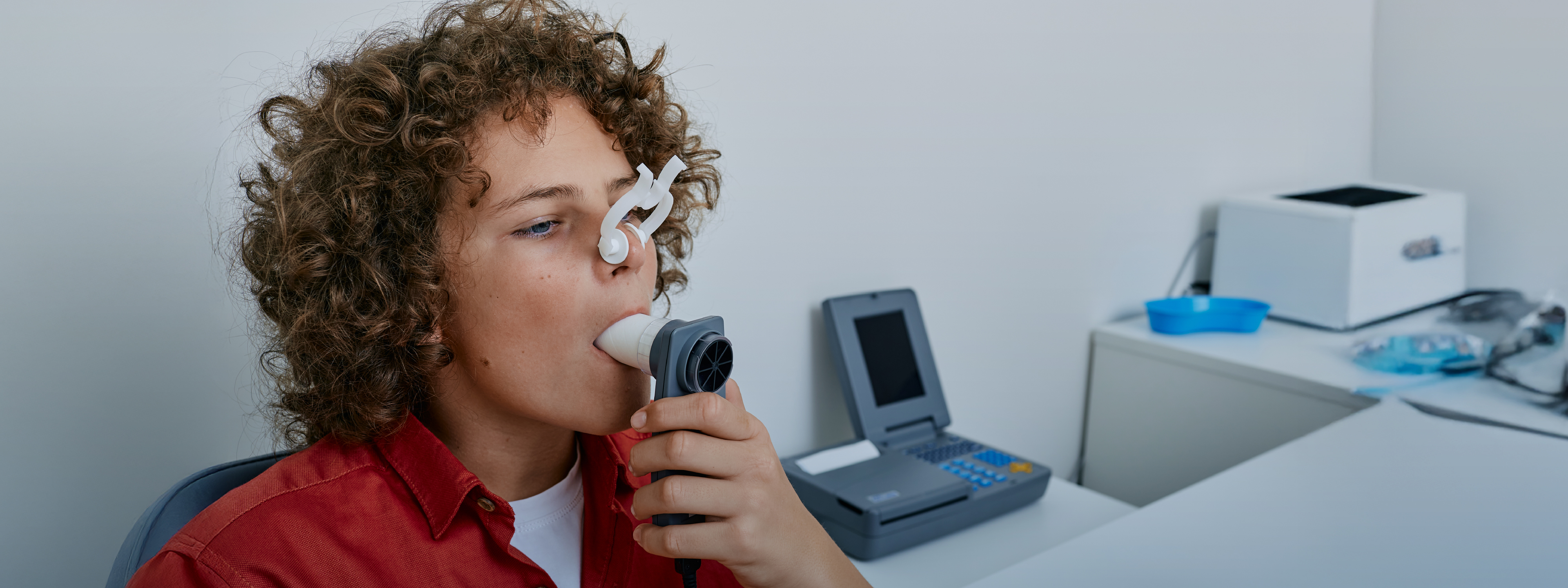 10+ years of exp
10+ years of exp
Languages
English and ArabicClinics
HealthHub - Arabian Center
HealthHub Day Surgery - Festival City
Home › Breath Test in Dubai

A breath test is a simple, non-invasive diagnostic tool used by gastroenterologists to uncover the causes of persistent digestive issues. If you’re experiencing chronic bloating, gas, or stomach discomfort, our Gastroenterology Department in Dubai offers advanced breath testing to diagnose lactose intolerance and small intestinal bacterial overgrowth (SIBO). This safe and painless procedure analyzes your breath to provide quick answers, helping you get on the path to better digestive health.
A breath test – often specifically a hydrogen breath test – measures the gases in your breath to evaluate how well your digestive system is processing certain foods. After you consume a specific test substance (such as a sugar solution), your body’s digestion either breaks it down properly or not. If it’s not fully digested, bacteria in your gut ferment the remaining sugars, producing gases like hydrogen or methane. These gases are absorbed into your bloodstream and exhaled in your breath. By collecting and analyzing breath samples, doctors can detect abnormal levels of these gases. In simple terms, a breath test lets us “see” how your gut is functioning without any invasive procedures. It’s completely needle-free and pain-free, making it a popular choice for diagnosing common gastrointestinal conditions.
We might recommend a breath test if you have symptoms or risk factors suggesting a problem with digesting certain foods or an imbalance in your gut bacteria. Situations where a breath test is useful include:
Preparing for a breath test is important to ensure accurate results. When you schedule your breath test at our clinic, we will provide you with clear instructions. In general, preparation involves:
Don’t worry – our team will give you detailed guidelines well in advance and answer any questions about the preparation. Following these steps ensures that when you take the breath test, the results will be as accurate and informative as possible.
When you come in for a breath test at our Dubai clinic, you can expect a straightforward and patient-friendly process:


A breath test works by detecting gases produced during digestion. If your body struggles to digest certain sugars (like lactose), or if excess bacteria are present in your small intestine (as in SIBO), these issues cause an increase in hydrogen or methane gas release. The test measures these gases in your exhaled breath after you ingest a specific test solution. High levels indicate a positive result, helping the doctor pinpoint conditions like lactose intolerance or SIBO without more invasive tests.
Yes, absolutely. The hydrogen breath test is very safe. It’s non-invasive, meaning nothing enters your body except the sugar solution you drink. The test does not cause pain. At most, some patients might feel a bit bloated during the process (because the sugar solution can produce gas if you have the condition being tested for), but this subsides quickly. The procedure is routinely performed on adults and even children when needed. Our staff monitors you during the test to ensure you’re comfortable.
They can be if not treated. While many ulcers are not immediately life-threatening, complications can be serious. An untreated ulcer might lead to internal bleeding, which can cause anemia or severe blood loss. There’s also a risk of perforation (a hole in the stomach/intestine), which is a medical emergency, and obstruction (blockage due to swelling or scarring). The good news is that with proper treatment, most ulcers heal and complications are avoided.
Hydrogen breath tests can be performed on children as well as adults. The test is non-invasive and only requires the child to drink a sweet solution and blow into a tube, which most kids can do with a little encouragement. However, in practice, our clinic primarily performs breath tests for adult patients, since adults more commonly undergo this diagnostic in our facility. If a breath test is needed for a child, our gastroenterology team would typically coordinate with a pediatric specialist to ensure the child is comfortable and the procedure is done correctly. We always tailor our approach to the patient’s age and needs.
The breath test takes about 2 to 3 hours. You should stay at our clinic the entire time. We often provide preliminary results the same day. Our doctor will discuss the findings and next steps before you leave.
A positive result confirms an issue like lactose intolerance or SIBO. For lactose intolerance, we suggest dietary changes, lactase enzyme supplements, and alternative calcium sources. For SIBO, the doctor may prescribe antibiotics and a low-FODMAP diet. Our goal is to alleviate symptoms and improve your digestive health.
Yes, we offer hydrogen breath tests for lactose intolerance and SIBO, and urea breath tests for H. pylori infection. However, we do not provide FibroScan; we refer patients to specialized centers for advanced liver imaging. We ensure comprehensive gastrointestinal care by collaborating with trusted facilities when needed.
Scheduling a breath test or consultation is simple. Contact our Gastroenterology Department by phone or online. Indicate you’re interested in a breath test for lactose intolerance or SIBO. Our staff will help find a convenient time. We’ll give preparation instructions before the test. If you have a referral, bring it along, but it’s not always required. Book a consultation with our gastroenterologists to evaluate symptoms and arrange the test. Reach out to book an appointment – our team is ready to guide you.
 10+ years of exp
10+ years of exp
HealthHub - Arabian Center
HealthHub Day Surgery - Festival City